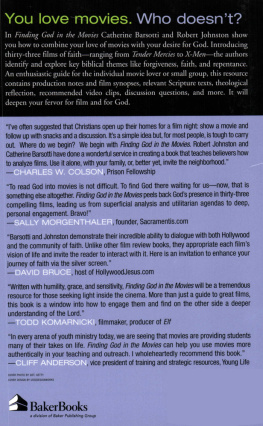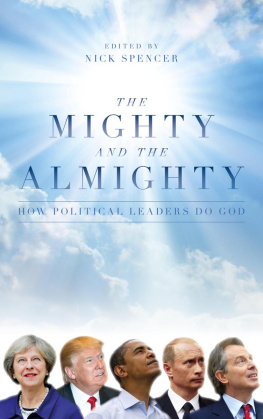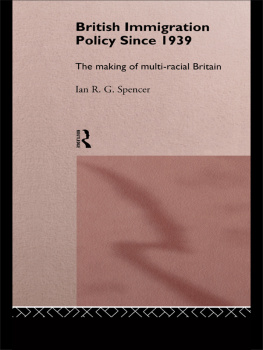
2004 by Catherine M. Barsotti and Robert K. Johnston
Published by Baker Books
a division of Baker Publishing Group
P.O. Box 6287, Grand Rapids, MI 49516-6287
www.bakerbooks.com
Ebook edition created 2011
All rights reserved. No part of this publication may be reproduced, stored in a retrieval system, or transmitted in any form or by any meansfor example, electronic, photocopy, recordingwithout the prior written permission of the publisher. The only exception is brief quotations in printed reviews.
ISBN 978-1-5855-8156-6
Library of Congress Cataloging-in-Publication Data is on file at the Library of Congress, Washington, DC.
Unless otherwise indicated, Scripture is taken from the New Revised Standard Version of the Bible, copyright 1989, Division of Christian Education of the National Council of the Churches of Christ in the United States of America. Used by permission. All rights reserved.
Scripture marked NIV is taken from the Holy Bible, New International Version. NIV. Copyright 1973, 1978, 1984 by Biblica, Inc. Used by permission of Zondervan. All rights reserved worldwide. www.zondervan.com
Scripture marked KJV is taken from the King James Version of the Bible.
Scripture marked RSV is taken from the Revised Standard Version of the Bible, copyright 1952 [2nd edition, 1971] by the Division of Christian Education of the National Council of the Churches of Christ in the United States of America. Used by permission. All rights reserved.
For Rachel, Ruth,
Rebecca, and Faith
in the hope that they will
find God in the midst of life
Natural things
And Spiritual,who separates those two
In art, in morals, or the social drift,
Tears up the bond of nature and brings death,
Paints futile pictures, writes unreal verse,
Leads vulgar days, deals ignorantly with men,
Is wrong, in short at all points....
Earths crammed with heaven,
And every common bush afire with God;
But only he who sees, takes off his shoes
The rest sit round it and pluck blackberries....
Not one day, in the artists ecstasy,
But every day, feast, fast, or working day,
The spiritual significance burns through
The hieroglyphic of material shows,
Henceforward he would pain the globe with wings,
And reverence fish and fowl, the bull, the tree,
And even his very body as a man.
Elizabeth Barrett Browning, Aurora Leigh
Contents
and
and
and
and
Preface
In contemporary parlance, to be enthusiastic is to be excited about something, even passionate. But it is interesting to note enthusiasm comes from two Greek words en and theos, meaning in God. We point this out because it is important for readers to understand at the outset our enthusiasm for movies, in both senses of this word. We enjoy watching movies; they are one of our passions. We also have found God to be present in movies; they are inspirational. The well-known director Martin Scorcese said, My whole life has been movies and religion. Thats it. Nothing else. This is perhaps overstating the case for us; we love our families, we enjoy the beach, our work is fulfilling, and serving others brings us joy. But we understand something of Scorceses statement nonetheless.
This book would not have been possible without others who share our enthusiasm, and we would like to thank them for their assistance. Jane Swanson-Nystrom, the managing editor of The Covenant Companion, was the first to ask us to write theological reflections on current movies. We have done this on a bimonthly basis for the last eight years. The initial drafts of our Synopsis and Theological Reflection that form the core of each movie discussion first appeared in the pages of this periodical. Doug Wysockey-Johnson, executive director of Faith at Work, has also been a strong encourager, using a selection of these same reviews in his journal, Faith@Work. During this same time period, we have hosted a movie group that meets regularly to watch and discuss films. The discussion takes place while we eat a meal together in the style of the selected film (yes, even cooking a Babettes Feast). These friends have been our dialogue partners and coaches, helping us to understand better what we have seen. We also want to thank our studentsthose who attend Centro Hispano de Estudios Teolgicos and Fuller Theological Seminary as well as the many Young Life staff who have studied with us. Finally, we need to thank the technology support team at Fuller, especially Zachary Abbott. Just as the production of a movie is a corporate act, so our movie dialogue has been a community event.
We have written this book in the hope that our enthusiasm will increase your enthusiasm, initially for film but ultimately for God. Typically, many in the church have bracketed God out of Hollywoods secular entertainment. Isnt it just a mindless escape, at times even faith denying? An understanding of common grace, of the wider work of Gods Spirit throughout and within all creatures and creation, would suggest that this is not the case. God is, after all, in the midst of lifeall of it. This includes the movies. We hope this book will strengthen your reel faith.
Finding God in the Movies
An Introduction
Should the church be interested in Hollywood? In her book God-Talk in America, Phyllis Tickle makes the provocative claim that more theology is conveyed in and remembered from one hour of television than from all the sermons preached in a given weekend.
We wish to make a similar claim concerning popular movies. God is present in the movies for those who have eyes to see and ears to hear. Theology is being portrayed in and will be retained from the movies we see each week at the cineplex. Though late to recognize this fact, the church is now awakening to the idea that Hollywood is providing an important resource for its teaching, preaching, youth ministry, and outreach activities. This book is meant to help Christians find God in the movies, to use reel faith to encourage and strengthen real faith.
For some readers, the topic of finding God in the movies will be familiar territory. For others, after you have read this brief introduction to a complex and vibrant topic, you will want to It is a larger introduction to the subject of theology and film and is being used as a textbook by a number of colleges and seminaries across the country. Nevertheless, we trust this introduction will provide enough information for many purposes, including preparing to lead a film-based discussion group, rounding out ones own view of finding God in the movies, and preaching sermons that either visually or verbally incorporate cinematic sources. Our hope is for this introduction to outline why the church should be taking movies seriously and how we might best uncover a visual storys center of power and meaning.
Big Business
When we ask students how many movies they watch in a month, the typical answer is eight to ten, and responses have ranged as high as fifty-five! People are watching movies in record numbers. In 2002, Americans spent over $9.4 billion on movie tickets, up more than 10 percent from the previous year. Even with higher prices, actual admissions also rose, reaching their highest level in over forty-five years1.5 billion people. But this is only part of the story. In 2002, DVD sales reached a staggering $8.7 billion, in addition to the $3.4 billion spent on VHS. To give but one example of the lure of DVDs, ticket sales for Spider Man in its first weekend at the theaters reached $ 115 million, while DVD sales on its first weekend range in excess of $190 million.
We cant forget about rentals and cable either. Blockbuster and Hollywood chains are ubiquitous. Home rentals are a weekly ritual for many families, particularly if parents leave the kids with a babysitter. Many who are under thirty consider video, like computers, cell phones, and food, simply a part of normal life. Already in 1998, $8.1 billion was spent on video rentals. Beyond the DVD, a host of television channels such as HBO, Showtime, and The Movie Channel are part of the viewing habits of still millions more. Moreover, cable seems to know no socioeconomic distinction. Most do not consider it a luxury.
Next page






